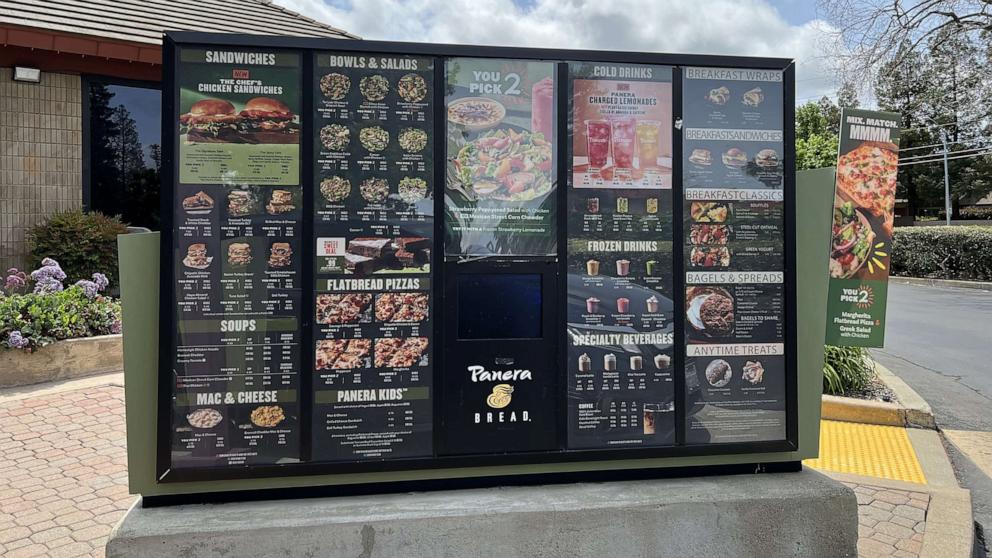
Panera Bread is facing a third lawsuit regarding its caffeinated lemonade drink.
The newest suit comes as the fast-casual bakery and cafe chain faces two ongoing lawsuits alleging wrongful death regarding their charged lemonade drinks. The third suit, filed on Jan. 16, alleges the drink led to “permanent” heart problems suffered by the plaintiff.
In the suit, obtained by ABC News, one of the plaintiffs, Lauren Skerritt, claims she is suffering “permanent cardiac injuries” as a result of drinking Panera’s Charged Lemonade.
"Lauren was otherwise healthy and had no underlying medical condition," the suit says.
The complaint, which was filed in Delaware, alleged that Skerritt "ordered and consumed" two-and-one-half Panera Charged Lemonades in April at a location in Rhode Island.
Skerritt, a vegetarian, said she primarily ordered Charged Lemondate “because it was advertised as 'plant-based' and 'clean,'" the suit reads.
MORE: Panera Bread faces second wrongful death suit from caffeinated 'charged lemonade'After consuming the lemonade drinks, the suit alleges Skerritt experienced "episodes of palpitations with one near syncopal episode." After seeking medical help the following day, Skerritt said she had a syncopal episode in the hospital and was moved to a critical care unit as her heart rate spiked.
After experiencing “recurrent episodes of rapid heartbeat,” she visited a hospital again in August, where she was treated for new-onset atrial fibrillation.
Skerritt “continues to experience supraventricular tachycardia with associated shortness of breath, palpitations, brain fog, difficulty thinking and concentrating, body shakes, and weakness,” according to the complaint.
The filing also alleges Skerritt “developed a tremor in her left hand.”
In the wake of the first wrongful death suit in October, the restaurant chain began advising customers that the drinks contain "about as much caffeine as [Panera's] Dark Roast Coffee" and has cautioned customers to "use in moderation," with a disclaimer that it is "not recommended for children, people sensitive to caffeine, pregnant or nursing women."
The 30-ounce large-size version of Panera’s Charged Lemonade was previously listed on the chain’s menu as containing 390 milligrams of caffeine at the time of the first lawsuit, which is just 10 milligrams shy of the recommended daily maximum adult consumption amount of caffeine, according to the U.S. Food and Drug Administration.
The Panera menu now states the same drink contains 237 mg of caffeine. ABC News learned Panera is undertaking the process of updating its menu materials and information.
Panera Bread did not respond to a request for comment on the latest lawsuit by the time of publication.
Panera is facing two prior wrongful death lawsuits both related to the charged lemonade product.
In October, a lawsuit filed in Philadelphia alleged that 21-year-old University of Penn student Sarah Katz died from cardiac arrest after drinking the charged lemonade from Panera Bread.
Panera said it had updated the online and app caffeine information in a statement from the chain after the lawsuit.
MORE: Panera Bread issues new warning for 'charged lemonades' amid wrongful death lawsuit"We were saddened to learn last week about the tragic passing of Sarah Katz. While our investigation is ongoing, out of an abundance of caution, we have enhanced our existing caffeine disclosure for these beverages at our bakery cafes, on our website and on the Panera app," a spokesperson for Panera told ABC News in a statement at the time.
At age 5, Katz was diagnosed with Congenital Long QT Syndrome Type 1, which can result in potentially life-threatening abnormal heart rhythms due to potassium ion channels in the heart not working properly, disrupting the heart's electrical activity.
According to the lawsuit obtained by ABC News, at the time Katz drank the charged lemonade, it was not advertised by Panera as an "energy drink."
In December, a Florida family alleged in a wrongful death suit that the charged lemonade caused a man named Dennis Brown to go into cardiac arrest.
The lawsuit alleged that 46-year-old Brown was a member of the restaurant's "sip club," which allows customers to order unlimited drinks, consumed charged lemonades with his dinner at a Panera location near his job in Florida and later died while he was walking home.
The lawsuit states Panera advertised the plant-based charged lemonades, which come in three flavors, as taking lemonade to the next level with "clean caffeine" as an instant energy drink derived from guarana and green coffee extract.
According to ABC Atlanta affiliate station WSB, Brown had a chromosomal disorder, and those close to him – including his supportive living coach, Deann Burgess – said that Brown "did not buy energy drinks or anything like that."
Brown's family told WSB that Brown avoided energy drinks due to having high blood pressure.
Brown had been drinking charged lemonades regularly before he died, according to the lawsuit.
Following the December suit, a spokesperson for Panera Bread told ABC News. "Panera expresses our deep sympathy for Mr. Brown's family. Based on our investigation, we believe his unfortunate passing was not caused by one of the company's products."
Elizabeth Crawford is the attorney representing all three cases against Panera, and confirmed to ABC News that all are ongoing.
In moderation, caffeine consumption is not considered dangerous, though effects can vary.
"Generally, at lower doses, caffeine is not harmful, but at higher doses, we begin to discuss the negative effects they can have on our body," ABC News medical contributor Dr. Darien Sutton said. "The FDA recommends that the average adult drinks no more than 400 milligrams of caffeine a day."
That amount, 400 milligrams a day -- which is approximately four or five cups of coffee -- is "not generally associated with dangerous, negative effects" for healthy adults, according to the U.S. Food and Drug Administration.
The FDA has noted that there is a "wide variation in both how sensitive people are to the effects of caffeine and how fast they metabolize it," especially for certain conditions and some medications, which the FDA says "can make people more sensitive to caffeine's effects."
ABC News' Kelly McCarthy contributed to this story